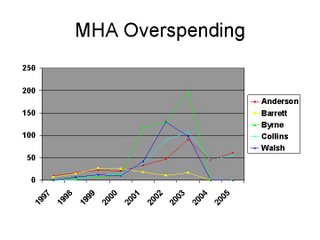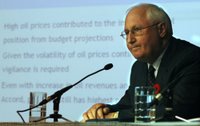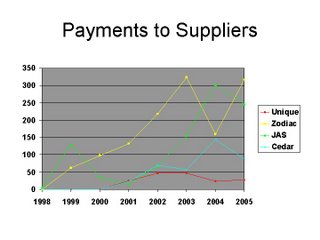So Premier Danny Williams is threatening to fling mud at the opposition Liberals who are criticizing some of his decisions since taking office.
Ok.
That's normal politics.
No surprise that the five or six planted talk show callers - all of whom deny receiving transmissions from Borg Central - miraculously started spitting out the same sort of things that Danny started spouting. Like Minnie, for example, who recently attacked Judy Foote over traveling with her husband on government expense, something that happened before the last election.
When the host reminded Minnie of the untendered publicity work done after the offshore deal was signed Minnie dutifully chastised the host for bringing up "the past".
Maybe they don't get e-mails or phone calls. Maybe there's a website they all long onto. Or maybe the chips implanted at the base of their skulls receive messages automatically from the Hive. But there's just too much of a similarity in the words and phrases - and memories are way too good - for the attacks to be merely coincidence.
Anyway, the whole thing raises a few obvious points:
1. Danny Williams promised a new approach to politics. Business as usual is not a new approach. Danny Williams' defence of his own actions now typically rests on the fact that he really isn't any worse than The Other Crowd. He told us to expect better. We do.
So where is "better"?
Well, according to the Danny-boys better would be a relative concept. If The Other Crowd let 10 contracts without tender and we let five, then we are relatively better. Promise kept.
Only problem is that ethics in government doesn't work that way. An untendered contract is bad.
Period.
This moral relativism is like the defence mounted of a former deputy premier, later premier, who faced an accusation that members of his staff and his family had accepted gifts from a guy doing business with the minister's department.
Two local commentators took the view that the whole thing was alright since we weren't nearly as corrupt as they are in Nova Scotia.
Form the realm of moral relativism, we wait with bated breath for someone to bring up Alfred Morine and Sir Richard Squires to justify current questionable goings-on.
2. Talk is cheap. The Premier mentioned Lower Churchill spending in the CBC story linked above. Since the Lower Churchill project office - set up by Brian Tobin - continues to operate under Danny Williams and as under Tobin reports to the Premier's Office, would the Premier do something the other guys didn't do: table the expenses in the legislature?
Extra ambulances are standing by for those foolish enough to hold their breath on that one.
[Update: A late afternoon e-mail advised that the Lower Churchill office management arrangement has been changed. Good news says we around here. In reply, your humble e-scribbler asked two things:
1. May we post the e-mail in its entirety?; and,
2. So what are the expenses?
let's see what happens.]
3. Promise made...well...ummm. From da Blue Book:
A Progressive Conservative government will base policies and regulations for the procurement of goods and services and capital works on the following principles:Well, untendered contracts are in fact a simplified process but somehow that isn't what most people would have expected.
* Open and effective competition.
* Value for money assessed on the basis of net economic benefit to the Province as well as acquisition cost.
* A simplified tendering process.
* Participation of local business and industry.
* Environmental protection.
* Ethical conduct and fair dealing.
Simple answer here is that this is a promise made that isn't being kept and likely won't be kept. Would any other political party be any different?
Likely not.
And that's the issue.
4. But since you raised the idea of untendered contracts...read on in da Blue Book:
Authorize the head of the [Government Purchasing] Agency to issue Certificates of Exemption from the requirement to invite public tenders in accordance with clear criteria that will be specified in the Act.Check the Public Tender Act and you won't find the promised changes.
Designate the head of the Agency as an Accountable Officer with responsibility to report all public tenders and Certificates of Exemption to the House of Assembly on a monthly basis, and to certify compliance with the Public Tender Act.
Even if the changes weren't made, though, there'd be nothing to stop any administration from reporting exemptions to the Act authorized by...say treasury board or cabinet...to the House of Assembly or to the public at large through the government website.
Nothing except the public comment such an approach would invite.
Now public comment would not be a deterrent to a government committed to accountability and transparency as more than an advertising slogan.
Apparently, public disclosure of untendered contracts has been a deterrent to this administration on at least one occasion. After all, in their first year in office, the Current Crowd awarded a $98,000 contract for opinion research on the branding initiative. It was done without tender. In fact, it was done so quietly, some advertising agencies in town didn't even know the contract had been let in late 2004 until they were informed by your humble e-scribbler. The company that got that job subsequently handled the entire branding job. We found out through an access to information request.
That's four points to get you started. undoubtedly, there'll be more as we wind down to Christmas.







